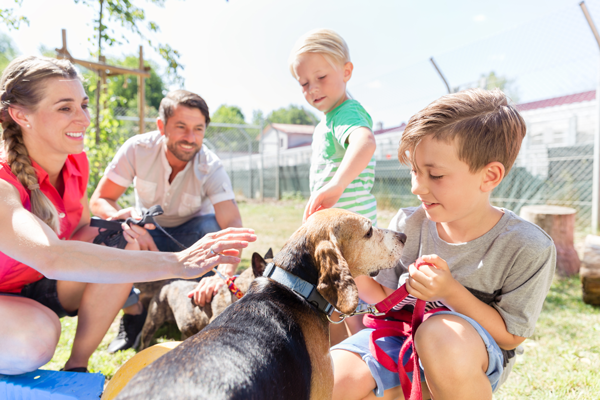Your Rescue Dog: 5 Ways to Welcome Them Home

As the proud owner of a new rescue dog, you’re doing all that you can to make your furry family member feel right at home. When you rescue a dog, you’re saving a life. The first few weeks and months are an adjustment period for both you and your new pet. Follow these five tips to help your pet transition into their forever home.
1) Follow Your Pet’s Lead On Exercise
Some pets may be filled with anxious energy upon their arrival to a new home, while others may be overwhelmed by the stress of the adjustment and need some time to settle in and become comfortable. Pay attention to your pet’s cues on how much exercise they need. If your dog is showing anxious behaviors, such as chewing, barking, excessive panting, separation anxiety, etc., it’s likely that they need some extra exercise to help settle their nerves. If your dog isn’t used to regular walks, break the exercise up into a few different sessions each day. 10 minutes of walking three times each day is enough to help ease the nerves of most dogs. If your new dog is on the other end of the spectrum and seems tired or lethargic during the adjustment period, remember that walks are not the only way to help your pet exercise. Playing with a fun new toy or walking around with other dogs at the dog park are great ways to get a reluctant pet moving.
2) Get Your Pet’s History
Many rescue dogs come from situations in which they weren’t treated with the love and kindness that they deserve. When you’re adopting your dog, talk with the shelter manager or other caretaker about your dog’s life experience. This may be hard to piece together, especially if your dog was removed from a dangerous situation by authorities. The more information you can gather, the better. You may be able to pinpoint specific triggers that may upset your pet, or understand anxious behavior displayed by your new dog. Know their history can help you and your veterinarian work together to create a therapeutic behavioral plan to help your pet heal from past hurts.
3) Dog DNA Testing
While your pet’s life history can be helpful, it’s also a good idea to understand your dog’s genetic makeup. Dog DNA testing is a great way to get a deeper understanding of your dog’s temperament, potential health problems, and behavioral tendencies. You may find that your dog is a mix of two purebreds, and therefore susceptible to genetic issues related to overbreeding. You may find out that one of the breeds in your dog’s genetic mix is susceptible to certain preventable health problems, such as tooth decay or diabetes. When you have this information, you’re able to do more to help your dog live a long and healthy life. Embark offers great dog DNA test and is our top rate dog DNA testing company. We have an Embark coupon to help you save a few dollars on your test.
4) Prepare Your Children
If you have kids at home, it’s important to prepare them for the arrival of your rescue dog. Let your kids know that they’ll need to be gentle and pay attention to your dog’s behavioral cues. Talk with them about how a dog shows when they’re relaxed and comfortable, as well as how a dog shows when they’re nervous or scared. Introduce your children to the dog slowly, and make sure that you supervise interactions until you feel fully comfortable with your child and dog being alone together. It’s a good idea to ask the shelter if your dog has any previous experience with children.
5) Introduce Other Animals Slowly
Whether you have other pets at home or are simply going to take your dog to a behavior class, it’s important that you introduce other animals slowly. Interactions with other pets should always be supervised for at least the first few weeks that your dog is home. Know that it’s normal for animals to be apprehensive of each other, and that they usually come to tolerate each other in time. If any of your pets are showing excessively aggressive behavior towards one another, it’s a good idea to consult a behavioral specialist on techniques you can use to alleviate the tension between them.
Overall, just remember to take things slow and don’t set unrealistic expectations for you new dog. Some adjust quickly while others take awhile. Either way, just give you new dog love and patience.
https://dogdnatestingreviews.com/news-info/your-rescue-dog-5-ways-to-welcome-them-home/https://dogdnatestingreviews.com/wp-content/uploads/2019/07/dog-dna-testing-rescue-dog.pnghttps://dogdnatestingreviews.com/wp-content/uploads/2019/07/dog-dna-testing-rescue-dog-150x150.pngNews & InfoAs the proud owner of a new rescue dog, you're doing all that you can to make your furry family member feel right at home. When you rescue a dog, you're saving a life. The first few weeks and months are an adjustment period for both...Penny joelmwood@hotmail.comAdministratorAlright, this isn't really a dog writing but I had to show off our pup, Belle. I'm Penny. A dog lover and now becoming a dog DNA testing expert (or trying at least). I love writing and have been doing it professionally for 10 years. And now I get to write about my favorite topic - dogs. Hope the information you find on our dog dna testing review site is helpful and definitely reach out if you have questions. Thanks!Dog DNA Tests Reviews